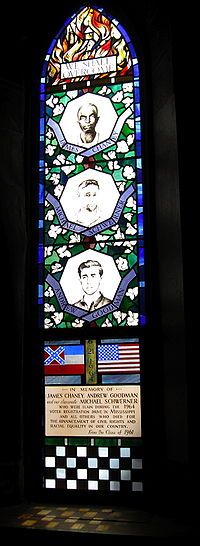This is your morning Open Thread. Pour your favorite beverage and review the past and comment on the future.
Find the past “On This Day in History” here.
Click on images to enlarge.
June 21 is the 172nd day of the year (173rd in leap years) in the Gregorian calendar. There are 193 days remaining until the end of the year.
On non-leap years (until 2039), this day marks the summer solstice in the northern hemisphere and the winter solstice in the southern hemisphere, and this is the day of the year with the longest hours of daylight in the northern hemisphere and the shortest in the southern hemisphere.
 On this day in 1964, Civil rights workers disappear.
On this day in 1964, Civil rights workers disappear.
In Neshoba County in central Mississippi, three civil rights field workers disappear after investigating the burning of an African American church by the Ku Klux Klan. Michael Schwerner and Andrew Goodman, both white New Yorkers, had traveled to heavily segregated Mississippi in 1964 to help organize civil rights efforts on behalf of the Congress of Racial Equality (CORE). The third man, James Chaney, was a local African American man who had joined CORE in 1963. The disappearance of the three young men garnered national attention and led to a massive FBI investigation that was code-named MIBURN, for “Mississippi Burning.”
 The Mississippi civil rights workers murders involved the 1964 lynching of three political activists during the American Civil Rights Movement.
The Mississippi civil rights workers murders involved the 1964 lynching of three political activists during the American Civil Rights Movement.
The murders of James Chaney, a 21-year-old black man from Meridian, Mississippi; Andrew Goodman, a 20-year-old white Jewish anthropology student from New York; and Michael Schwerner, a 24-year-old white Jewish CORE organizer and former social worker also from New York, symbolized the risks of participating in the civil rights movement in the South during what became known as “Freedom Summer”, dedicated to voter registration.
The case also made salient the efforts of Jews in the civil rights movement.
The Lynching
The lynching of the three men occurred shortly after midnight on June 21, 1964, when they went to investigate the burning of a church that supported civil rights activity. James Chaney was a local Freedom Movement activist in Meridian, Michael Schwerner was a CORE organizer from New York, and Andrew Goodman, also from New York, was a Freedom Summer volunteer. The three men had just finished week-long training on the campus of Western College for Women (now part of Miami University), in Oxford, Ohio, regarding strategies on how to register blacks to vote.
After getting a haircut from a black barber in Meridian, the three men headed to Longdale, Mississippi, 50 miles away in Neshoba County, in order to inspect the ruins of Mount Zion United Methodist Church. The church, a meeting place for civil rights groups, had been burned just five days earlier.
Aware that their station wagon’s license number had been given to members of the notorious White Citizens’ Council and Ku Klux Klan, before leaving Meridian they informed other Council of Federated Organizations (COFO) workers of their plans and set check-in times in accordance with standard security procedures. Late that afternoon, Neshoba County deputy Cecil Price – himself a member of the White Knights of the Ku Klux Klan – stopped the blue Ford carrying the trio. He arrested Chaney for allegedly driving 35 miles per hour over the speed limit. He also booked Goodman and Schwerner, “for investigation.”
Schwerner, Goodman, and Chaney were all denied telephone calls during their time at the jail. COFO workers made attempts to find the three men, but when they called the Neshoba County jail, the secretary followed her instructions to lie and told the workers the three young men were not there. During the hours they were held incommunicado in jail, Price notified his Klan associates who assembled and planned how to kill the three civil rights workers.
While awaiting their release, the men were given a dinner of spoonbread, green peas, potatoes and salad. When the Klan ambush was set up on the road back to Meridian, Chaney was fined $20, and the three men were ordered to leave the county. Price followed them to the edge of town, and then pulled them over with his police siren. He held them until the Klan murder squad arrived. They were taken to an isolated spot where James Chaney was beaten and all three were shot to death. Their car was driven into Bogue Chitto swamp and set on fire, and their bodies were buried in an earthen dam. In June 2000, the autopsy report that had been previously withheld from the 1967 trial was released. The report stated Chaney had a left arm broken in one place, a right arm broken in two places, “a marked disruption” of the left elbow joint and may also have suffered trauma to the groin area. A pathologist who examined the bodies at the families’ request following their autopsies noted Chaney also had a broken jaw and a crushed right shoulder which were not mentioned in the autopsy report. As the autopsy photographs and x-rays have been destroyed, the injuries could not be confirmed.

 On this day in 1944,
On this day in 1944, 



Recent Comments